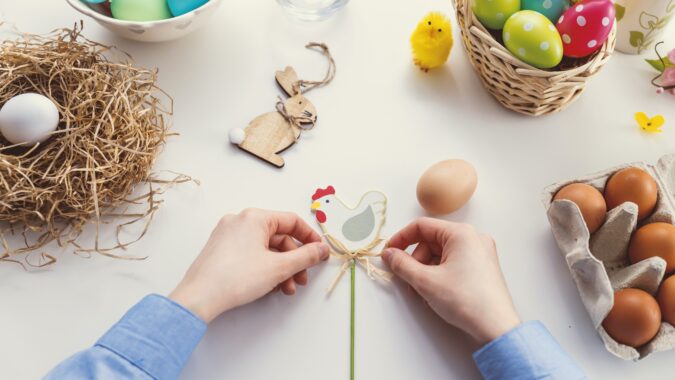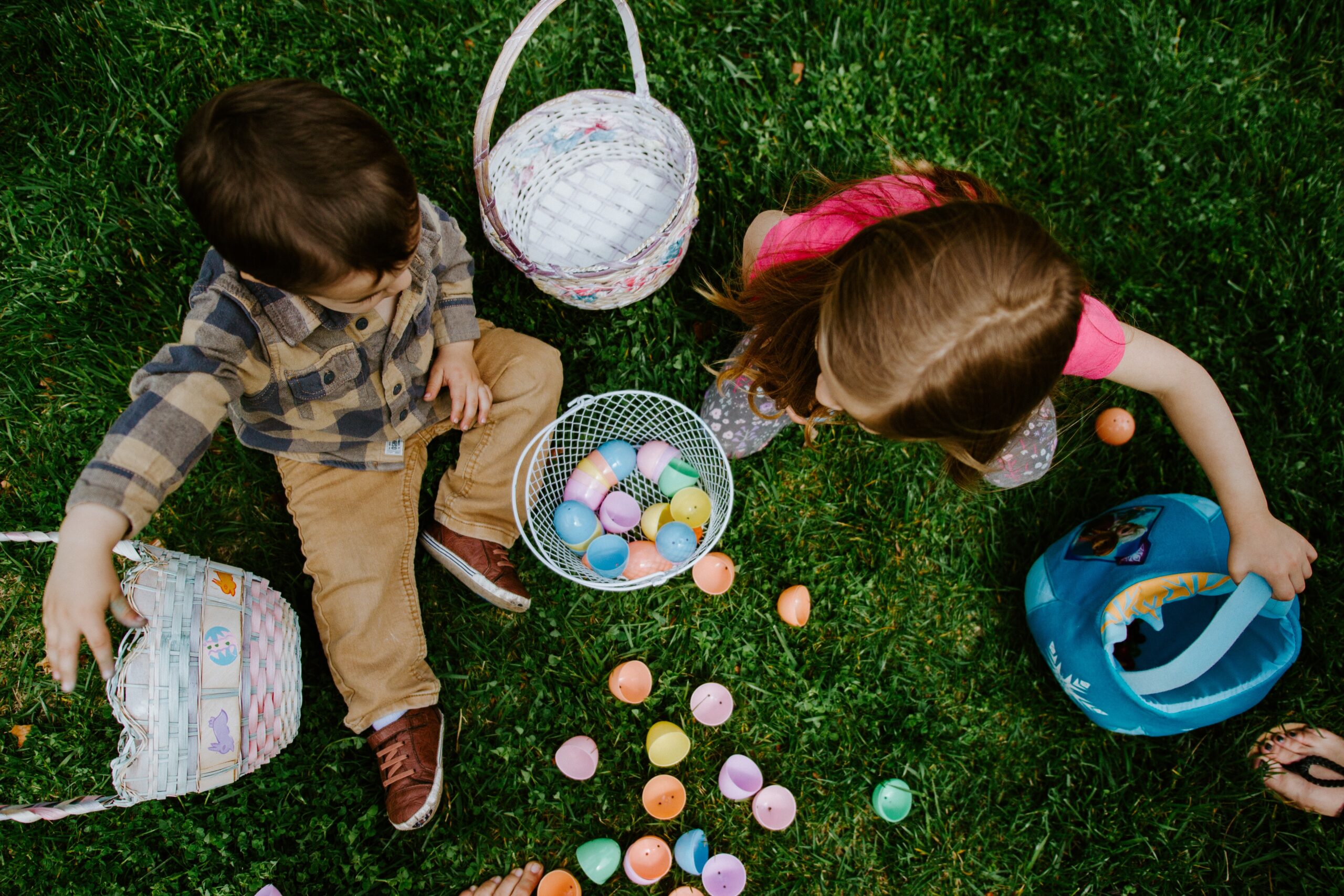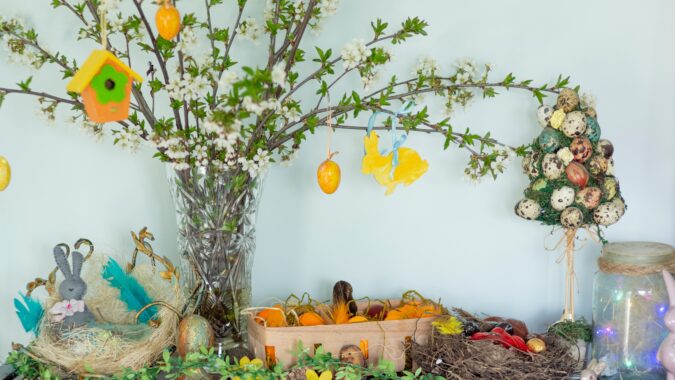How to Have a Low Waste Easter
Not everything about Easter is eggcellent. Despite that classic pun being used in every marketing campaign for the holiday, the celebrations create lots of eggstra waste (ok, the puns stop here). We Brits spend around £300 million on chocolate at Easter every year but produce tonnes more food, packaging, and other waste celebrating.
And it’s not just our additional chocolate consumption that creates more waste at this time of year. There’s extra food for an Easter feast, decorations, cards, and wrapping paper for gifts. Lots of this rubbish is recyclable, yet plenty still makes its way to landfill. With a few tips, we can change this and keep Easter the sign of new life it’s supposed to be.
Crack on with these fascinating facts about the holiday and ideas for a low and zero waste Easter at home and in your business.

Zero waste Easter ideas
There are plenty of fun ways you can celebrate Easter without creating mountains of rubbish. All you need is a little bit of planning and effort to have a zero waste Easter at home or in the workplace. Get started with these low and zero waste Easter ideas.
Plan a zero waste
Easter egg hunt
Many Easter eggs come with lots of packaging that’s not always 100% recyclable – especially if it gets damaged being hidden outside. Hiding chocolate eggs with no protection isn’t a hygienic or safe idea inside or outside though. There are plenty of other ways you can plan and eggsecute (last one) a fun zero waste Easter egg hunt:
- Hide wooden eggs in the garden. Kids can find these and then get rewarded with a chocolate egg. They’re better for the environment than plastic eggs and can be reused next year or for other activities, such as painting.
- Make your own paper or card eggs if you’re having an indoor hunt. It’s a great way to use up any old paper and card you’ve got lying around and it can be recycled.
- Buy chocolate Easter eggs in foil without the additional plastic casing. This protects the chocolate when placed outside and the foil is recyclable.
- Decorate small stones with egg designs that you can reuse or wash off after the hunt.
- Give kids a map and clues to follow, rather than searching for eggs, with a big Easter-themed prize at the end.

Make your own
Easter treats
An easy way to avoid all the packaging waste that comes with Easter food is to bake your own sweet treats. There are many recipes out there for homemade hot cross buns, Easter eggs, chocolate Easter nests, simnel cake, and more. Store them in reusable containers or recyclable foil – more sustainable than plastic wrapping.
Making your own Easter eggs is easier than you may have thought too. Choose a chocolate bar in paper, recyclable, or minimal packaging and use an old plastic mould or casing from an Easter egg from last year. Melt it into the mould, then when it’s solid decorate it with bits of chocolate, icing, and other treats.
Create homemade
Easter cards
Homemade Easter cards add a special touch and are a great way to use up any paper, card, and other materials you already have at home. If you’ve kept cards from last Easter you could cut them up and design a new card using these pictures.
You can still buy Easter cards, just make sure they’re made from recycled paper or card and don’t have any glitter or plastic bits that prevent them from being recycled. Alternatively, just send an email or social media message to celebrate Easter, as sending Easter cards isn’t as big as Christmas or birthday cards.
Select sustainable
Easter decorations
Lots of businesses and homes use plastic grass to add a spring touch. However, plastic grass is rarely recyclable and can take around 500 years to degrade. If it goes to landfill the chemicals the plastic contains can leach into the ground and contaminate nearby ground and water.
There are many sustainable and recyclable Easter decorations to consider instead. Flowers, plants, and branches make a great centrepiece and can be arranged into wreaths for natural decorations. Plenty of paper and card decorations are fully recyclable or can be kept for reuse next year.
You can also make your own Easter decorations from stuff at home. Use old toilet or kitchen rolls and attach little card ears and feet to create rabbits. Traditional hand-painted eggs are another great way to use up eggshells. Paint them or use felt tip pens, and add glitter, ribbons, and any other decorations.

Prepare a low waste
Easter feast
One of the main reasons for food waste at Easter is that we buy too much. It’s easy to get carried away planning a big roast or feast, but portion control is important for a zero waste Easter meal. Plan for the number of people you’re cooking for over Easter and how to store any leftovers.
There are lots of recipes to make the most of leftovers, such as hot cross bun crumble, Easter tray bake, and Easter tiffin to use up eggs before they go off. Savoury items like meat and veg can be added into casseroles, stews, and soups, while you can use bones to make stock. Consider freezing some food items too.
Lots of waste food can be composted if it’s no longer edible. This includes any fruit and veg peelings, eggshells, bread, meats, and dairy products. Learn more in our guide to composting
Easter recycling tips
Creating waste is as inevitable as feeling a bit sick after scoffing ten crème eggs at Easter. Rather than throwing away all rubbish you produce across the spring celebrations, there are many more sustainable options. Use these Easter recycling tips to avoid adding to landfill levels and have a more positive environmental impact:
- Remove food from recycling – reduce the risk of contamination by clearing off all bits of chocolate, sugar, and other foodstuffs from any Easter packaging.
- Check Easter egg packaging – you can recycle cardboard, paper, and foil that’s clean and dry from Easter egg packaging at home. However, check the symbol and number in the plastic shell and whether it’s recycled by your local authority.
- Take plastic wrappers to collection points – check if any plastic wrappers for packs of chocolate eggs and Easter sweets can be recycled in your household bins. If not, find a local supermarket with a collection box for plastic film or take them to a TerraCycle recycling point.
- Separate your recycling – make Easter recycling at work easy by ensuring you have individual bins for cardboard, paper, and plastics. Or consider a dry mixed recycling bin to combine many materials that makeup Easter packaging.
- Find ways to reuse materials – cut out designs from Easter cards and wrapping for arts and crafts activities, save decorations to use next year, and reuse any big boxes for storage. Consider any other ways to reuse such materials to reduce waste.
Looking for more Easter recycling tips?
Have your waste collected
Get a fast FREE quote for your waste collection 0800 211 83 90
- Free quote within 1 hr
- Any type of waste
- FREE bins and delivery
- We cover all of the UK